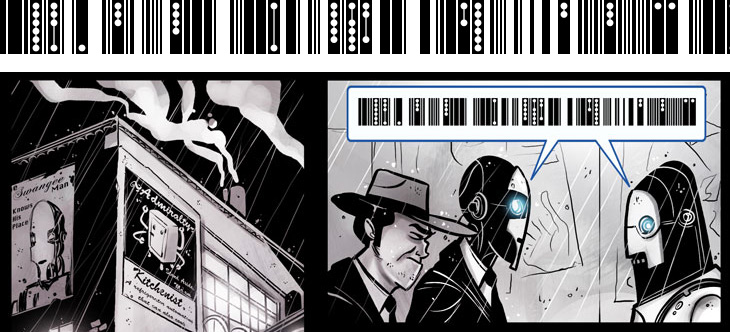I’ve been following Penny Arcade for quite some time now - they run commentary and opinion on games with short articles and webcomics, expertly written and drawn by Gabe and Tycho. They’ve recently been running a series of webcomics exploring various short stories (not strictly on gaming, but perhaps in universes shared with many games), one of which is Automata. It’s all rather good and worth following (part 1 here, 2 onwards from here), but one thing that got my attention was the representation of speech between the automata characters, shown below.

I like the addition of the dots to the barcode pattern, hinting at multiple tones and levels of sound - something interesting to add to a script - and as the character in the comic refers to it as ‘clickwise’ I got to wondering how languages with clicks were transcribed in the real world. Unsurprisingly, there are various forms of dots, circles and exclamation points, forming a kind of visual onomatopœia for clicks, ‘tsks’ and ‘tuts’.
Comics of course have a rich vocabulary of such things, and I find myself sometimes wishing for a bit more symbolic depth to the Latin alphabet - new forms of punctuation perhaps, maybe even a whole new script, or scripts. To illustrate and explain further, I think everyone has come across the problem of misinterpreting or being misinterpreted when using email - you thought you were making an oh-so-clever dry witticism and it comes across as scouring contemptuous sarcasm (say), so usually the only recourse is to pick up the phone so that your tone of voice can be heard. However, since we’re increasingly using text to communicate, especially in the social, rather than business or technical, arena, and even more importantly in the plain text and short form media such as SMS, we may need to expand our symbolic vocabulary to indicate things such as tone of voice, humour, sarcasm and sincerity. We have emoticons of course, and in time some of them (beyond 263A, 263B and so on) may find their way into Unicode, but they’re pretty blunt things and as it’s subtlety we need, we’ll need something a bit more flexible and, well, more like language.
It’s a thought.
